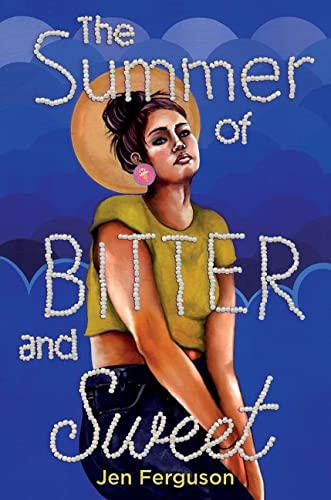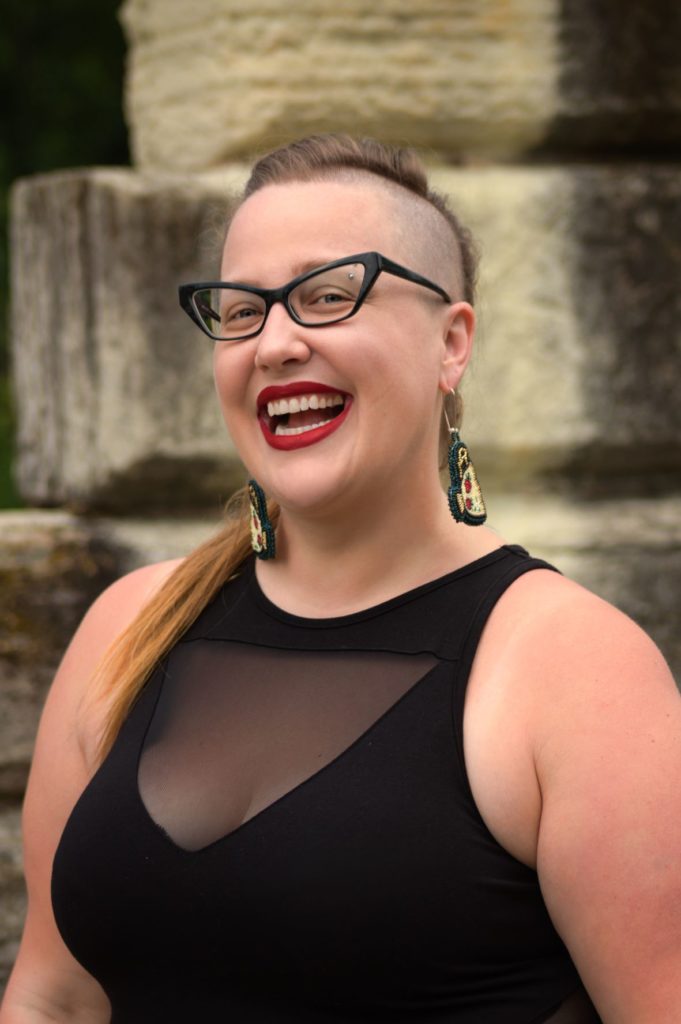After reading The Summer of Bitter and Sweet I knew I had to see if Jen Ferguson would chat with me. This book hollowed me out in the best way. It’s emotional and stunning all at once. Make sure to keep reading Ferguson answer some of my most pressing questions after reading!
About The Summer of Bitter and Sweet

Lou has enough confusion in front of her this summer. She’ll be working in her family’s ice cream shack with her newly ex-boyfriend—whose kisses never made her feel desire, only discomfort—and her former best friend, King, who is back in their Canadian prairie town after disappearing three years ago without a word.
But when she gets a letter from her biological father—a man she hoped would stay behind bars for the rest of his life—Lou immediately knows that she cannot meet him, no matter how much he insists.
While King’s friendship makes Lou feel safer and warmer than she would have thought possible, when her family’s business comes under threat, she soon realizes that she can’t ignore her father forever.
(Disclaimer: Some of the links below are affiliate links. For more information you can look at the Policy page. If you’re uncomfortable with that, know you can look up the book on any of the sites below to avoid the link)
Find The Summer of Bitter and Sweet on Goodreads, Amazon, Indiebound, Bookshop.org & The Book Depository.
Author Interview
Let’s talk about Lou and King’s friendship because it’s one of my favorite elements. Actually all of the friendships in this book were amazing. Can you talk about this ice cream scooping trio – how did these side characters come together to you in the drafting process? Which side character was the most difficult for you to write? Who needed the most revision? Who is your favorite of Lou’s family?
Ahhh, it’s one of my favourite elements too. And friendship is always high on my list of priorities when I write for teens. My friends kept me alive and taught me about the world and let me mess up and let me help them when they messed up. That’s friendship.
King was King before he had a name. He’s the gesture to my Toronto high school days, to my Toronto friends. I knew he’d be done most of the bullshit that Lou was processing by the time the novel opened. Like he understood his bisexuality and he had already gone through his reckoning of being racialized, of being Black in Canada. It’s not that his life is without problems, but he’s past the problems Lou’s struggling with.
Florence surprised me that she was Irish, but not too much. Oil is big business in Lloydminster, Alberta/Saskatchewan so it would make sense for someone new to show up if her parents were involved with big oil. I wanted someone to arrive on the scene after King left and to become important to Lou. I wanted that tension between the old friend vs. the new one and for them to realize that that stuff just isn’t important. Friendships aren’t measured in years. They’re about love. And you can’t measure love. Love is repeated action not time invested.
As much as King’s my favourite—I had such a hard time getting to his heart. I was carrying around a mental block. Because he was somewhat mysterious to Lou in early drafts, he wasn’t getting the attention he deserved as a full, rounded human being. My sensitivity reader for King, Antonio Michael Downing who is an incredible author and musician, got me on the phone and told me I needed to do better. During our conversation, I realized I had a mental block and oh my stars, in the next revision King showed up! And I loved him even more.
Can’t you tell who I loved most in Lou’s family? It’s totally Dom. He’s like a mix of my uncles and this absolutely wonderful gay Métis man with a passion for the land, ice cream, and his favourite cow, Mooreen the Utterly Delightful Cowtessa de Passteur.
So much of Lou and King’s friendship is tied up with Lou’s lies from the past and her own internalized racism, do you want to talk about your decision to include this past for Lou? I know you touch upon this a bit in the author’s note after the book, but for those who haven’t read it, what was it like to write a character influenced by some of the experiences of yourself as a teen? How did Lou come together as a character for you from the idea of the novel, to the drafting, to revising?
One of the reasons it took so long for me to write this book is that I was carrying around a lot colonial trauma and internalized racism from my upbringing in Canada, particularly from my K-12 and higher ed educations. My grandmother passed as white to escape the colonial institutions that would have taken her children from her—the residential schools and child services. She kept this secret from her white settler husband until her death.
That’s a lot for someone in the 7th Grade to process. And it wasn’t helped by the fact that when we learned about the Métis in school that history stopped immediately after Lou Riel’s execution by the state in 1885. It’s hard to understand yourself as existing in the present when your official history, according to the curriculum, ends in the 19th Century.
I’m a thinker. And a reader. And someone who comes to understanding slowly. It took me until my early 30s before I had addressed a lot of that colonial trauma. It took me until my early 30s until I understood that to not acknowledge and love and celebrate my Métis family, my ancestry, was doing exactly what the powers that be wanted me to do. It took me until my early 30s to recognize I could be both Métis and white, that these parts of myself could coexist, even if they don’t always coexist calmly.
But one of the other reasons why it took me so long to write this book was I’d never read a book with a Métis character in it until Cherie Dimaline’s The Marrow Thieves in 2017.
The exploration of Lou’s queer identity was particularly emotional for me to read. You mentioned that one book which was influential to you was LET’S TALK ABOUT LOVE which – hard same – are there other books you’ve read since that have made you feel seen? If you could tell teen you one thing, what would it be?
I think, like most queer people of the last decade, Simon Vs. by Becky Albertalli was a foundational read. That book was everywhere.
But Tillie Walden’s graphic novels, specifically On a Sunbeam and Are You Listening, both feel like they speak directly to my heart. If you haven’t read Walden yet, get on that!
Indigenous literature right now is absolutely on fire! These books break my heart and mend it with every word. Some to start reading right away: Billy-Ray Belcourt, Alicia Elliott, Cherie Dimaline, Waubgeshig Rice, Jordan Abel, Arielle Twist, and jaye simpson.
What would I tell teen me? All those novels you were writing in your bedroom late at night, instead of causing mischief and mayhem with your friends, well, it leads us here.
Did you have any other titles for this book? What was the process like for you and THE SUMMER OF BITTER AND SWEET from idea to submission to sale to publication?
Patricia Nelson, my most excellent agent, titled the book. I had called it “The Ice Cream Book” or “The Michif Creamery” for the longest time. Before this novel, I was good at titles. But I could not dream up a good title for this book on my own.
I’ve told this story before. But the short and sweet version is it took me many years and seven completed novels as an adult before an agent said yes. That book was The Summer of Bitter and Sweet. So my path to getting an agent is fairly typical. It took forever and a day.
But, we sold the book in a week.
That, you know, is very atypical.
I like to think that my luck and timing and general universe alignment came together in June 2020.
Why did you specifically pick ice cream? What’s your favorite flavor of ice cream from the book?
I had the idea for a business that was land-based. And really quickly knew that Dom, the architect and general creative person for the business was gay. Ice cream and sorbet themed by the colours of the rainbow arrived quickly after that. This was all in my very early plotting for the book. I wanted the creamery to also be a business that would stand out—in good and bad ways—on the Canadian prairies. The business itself is a point of conflict with what usually gets done on the land in Alberta/Saskatchewan.
Oh, I’m so basic. I’m a summer berries kind of girl. With lemon accents.
What were some hobbies or facts about Lou’s family that didn’t make it into the book? Did Lou’s mom always make earrings or was it ever something else?
With Lou’s mom it was always beading. I’m not a runner. But I’ve heard stories of this thing called “runner’s high.” And I realized that when everything goes well with beading—you know when you’re not stabbing yourself with the needle, losing it, tipping over your beads, having your cat walk through your beads—when it’s going well, everything falls away. It’s a moment of connection to the world, to your body, and to culture. I knew Lou’s mom needed this badly.
You know what? Not much didn’t make into the book and everything remained throughout revisions. Lou’s family and the details of their lives were critical to understanding a long history of colonial violence against Indigenous peoples.
But I have started a novel staring Lou’s cousin Molly, the year Molly graduates from high school. We’ll see if it ever ends up as a published book.
Find The Summer of Bitter and Sweet on Goodreads, Amazon, Indiebound, Bookshop.org & The Book Depository.
About the Author

Jen Ferguson (she/her) is Métis/Michif and white Canadian settler, an activist, a feminist, an auntie, and an accomplice armed with a PhD. She believes writing, teaching and beading are political acts. Her debut YA novel, The Summer of Bitter and Sweet, is out now from Heartdrum / HarperCollins, with a second YA novel, currently untitled, to follow in 2023.
Her first book for adults, Border Markers, a collection of interrelated flash fiction stories, is out now with NeWest Press. Her essay “Off Balance” was selected for the Best Canadian Essays 2020. Learn more about her short stories, essays, and poems.
She lives on Gabrielino Tongva territory and teaches fiction writing at Loyola Marymount University. You can reach her on twitter at @jennyleeSD or through her contact page.